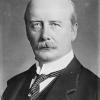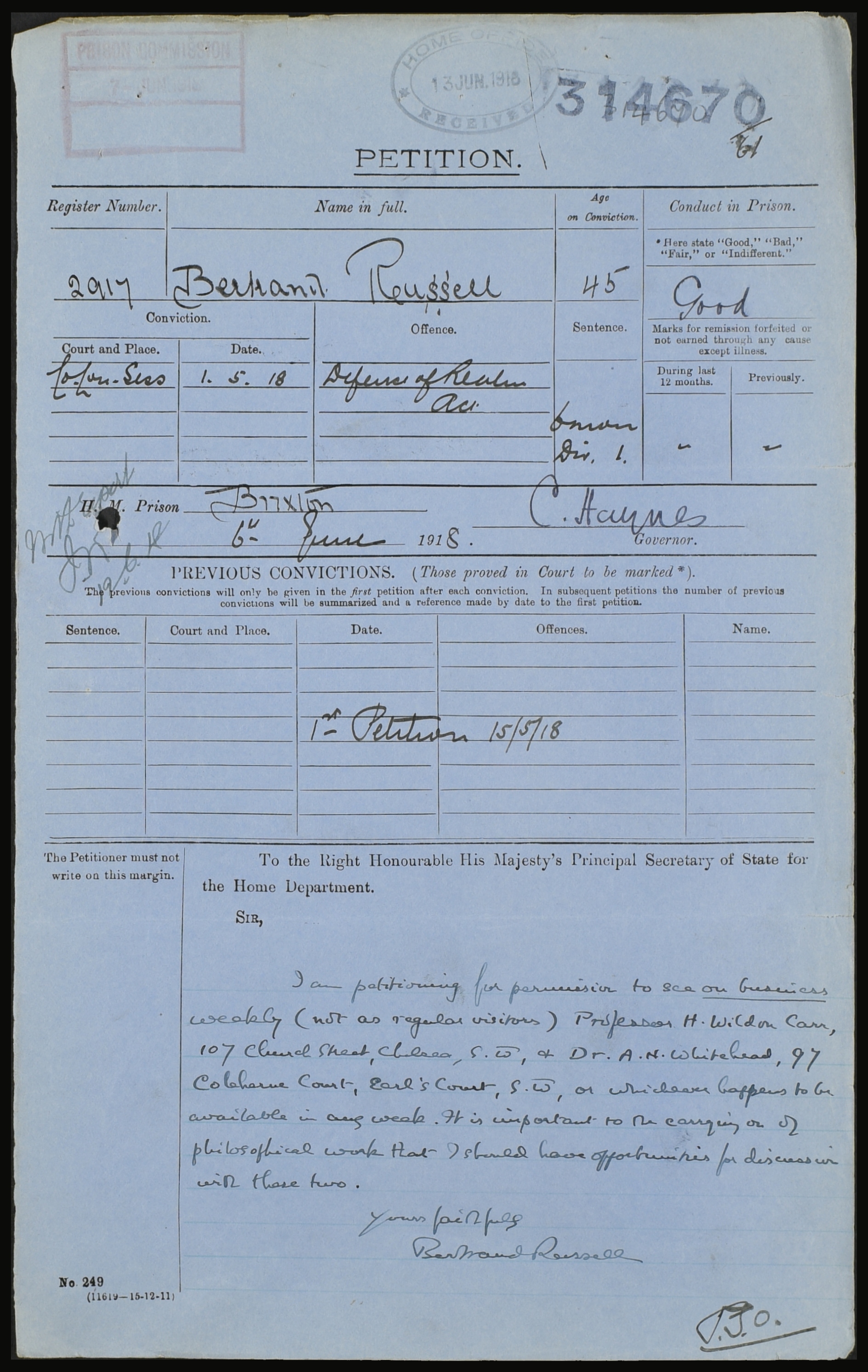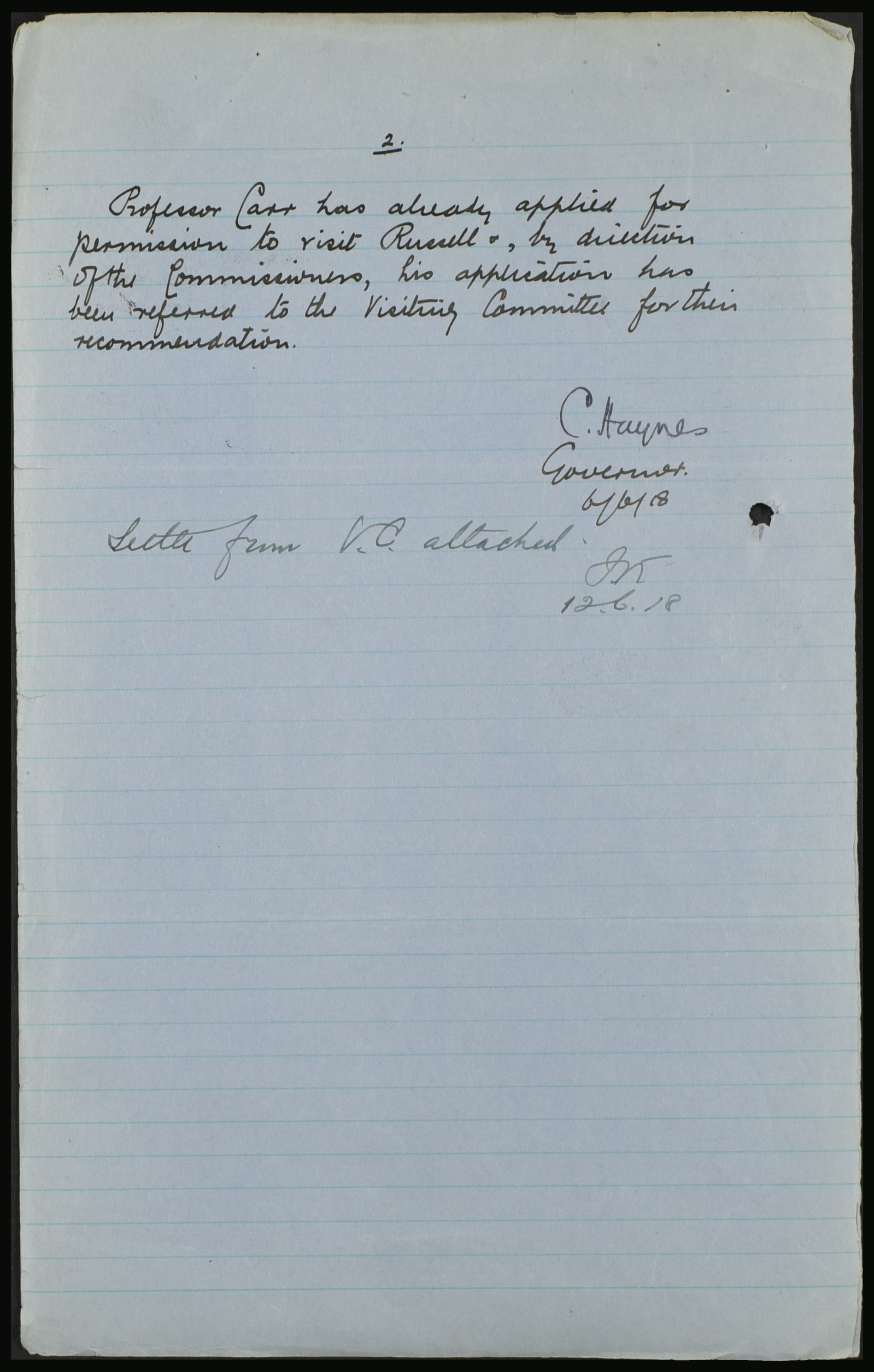
Brixton Letter 14
BR to Home Secretary / Sir George Cave
June 6, 1918
- ALS
- National Archives, UK
- Edited by
Kenneth Blackwell
Andrew G. Bone
Nicholas Griffin
Sheila Turcon
Cite The Collected Letters of Bertrand Russell, https://russell-letters.mcmaster.ca/brixton-letter-14Papers 14: App. XIII.4
BRACERS 57177
<petition form>1
H.M. Prison Brixton
6 June 19182
To the Right Honourable His Majesty’s Principal Secretary of State for the Home Department.
Sir,
I am petitioning for permission to see on business weekly (not as regular visitors) Professor H. Wildon Carr,3107 Church Street, Chelsea, S.W, and Dr. A.N. Whitehead, 97 Coleherne Court, Earl’s Court, S.W, or whichever happens to be available in any week. It is important to the carrying on of philosophical work4 that I should have opportunities for discussion with these two.5
Yours faithfully
Bertrand Russell
- 1
[document] The letter was edited from a digital scan of the signed, handwritten original, a blue petition form in the National Archives, UK. The verso of the single sheet is quoted in note 3 below. The petition was approved by “C. Haynes”, the prison Governor. The addressee’s formal title was printed on the form (see the image). The letter was published as App. XIII.4 in Papers 14.
- 2
[date] The date was written in another hand on the form in which the petitioner (i.e., BR) filled his portion with the above letter.
- 3
Carr Captain Haynes minuted on the verso of the petition: “Professor Carr has already applied for permission to visit Russell and, by direction of the Commissioners, his application has been referred to the Visiting Committee for their recommendation” (6 June 1918). A further note, dated six days later, stated that a letter from the Visiting Committee was attached. Its contents are unknown.
- 4
philosophical work This was BR’s state-approved job in prison, for which he won “marks” at the end, leading to earlier than expected remission of his sentence.
- 5
discussion with these two The petition was successful. BR had a “business” visit from Carr on Friday, 21 June and one from Whitehead on Monday, 24 June (Letter 27).
A.N. Whitehead
Alfred North Whitehead (1861–1947), Cambridge-educated mathematician and philosopher. From 1884 to 1910 he was a Fellow of Trinity College, Cambridge, and lecturer in mathematics there; from 1911 to 1924 he taught in London, first at University College and then at the Imperial College of Science and Technology; in 1924 he took up a professorship in philosophy at Harvard and spent the rest of his life in America. BR took mathematics courses with him as an undergraduate, which led to a lifelong friendship. Whitehead’s first major work was A Treatise on Universal Algebra (1898), which treated selected mathematical theories as “systems of symbolic reasoning”. Like BR’s The Principles of Mathematics (1903), it was intended as the first of two volumes; but in 1900 he and BR discovered Giuseppe Peano’s work in symbolic logic, and each decided to set aside his projected second volume to work together on a more comprehensive treatment of mathematics using Peano’s methods. The result was the three volumes of Principia Mathematica (1910–13), which occupied the pair for over a decade. After Principia was published, Whitehead’s interests, like BR’s, turned to the empirical sciences and, finally, after his move to America, to pure metaphysics. See Victor Lowe, Alfred North Whitehead: the Man and His Work, 2 vols. (Baltimore and London: Johns Hopkins U. P., 1985–90).
Brixton Prison
Located in southwest London Brixton is the capital’s oldest prison. It opened in 1820 as the Surrey House of Correction for minor offenders of both sexes, but became a women-only convict prison in the 1850s. Brixton was a military prison from 1882 until 1898, after which it served as a “local” prison for male offenders sentenced to two years or less, and as London’s main remand centre for those in custody awaiting trial. The prison could hold up to 800 inmates. Originally under local authority jurisdiction, local prisons were transferred to Home Office control in 1878 in an attempt to establish uniform conditions of confinement. These facilities were distinct from “convict” prisons reserved for more serious or repeat offenders sentenced to longer terms of penal servitude.
Governor of Brixton Prison / Carleton Haynes
Captain Carleton Haynes (1858–1945), the Governor of Brixton Prison in 1918, was a retired army officer and a cousin of BR’s acquaintance, the radical lawyer and author E.S.P. Haynes. In March 1919 BR sent Haynes, in jest, a copy (now in the Russell Archives) of his newly published Introduction to Mathematical Philosophy — so that the governor’s collection of works written by inmates while under his charge would “not ... be incomplete” (BRACERS 123167).
H. Wildon Carr
Herbert Wildon Carr (1857–1931), Professor of Philosophy at King’s College, London, from 1918 and Visiting Professor at the University of Southern California from 1925. Carr came to philosophy late in life after a lucrative career as a stockbroker. His philosophy was an idiosyncratic amalgam of Bergsonian vitalism and Leibnizian monadology, which, he thought, was supported by modern biology and the theory of relativity. He wrote books on Bergson and Leibniz at opposite ends of his philosophical career and a book on relativity in the middle. His philosophy would have made him an unlikely ally of BR’s, but it was Carr who organized BR’s two courses of public lectures, on philosophy of mathematics and the philosophy of logical atomism, which brought BR back to philosophy and improved his finances in 1917–18. Carr had great administrative talents, which he employed also on behalf of the Aristotelian Society during his long association with it. He was its president in 1916–18 and continued to edit its Proceedings until 1929.
Home Secretary / Sir George Cave
Sir George Cave (1856–1928; Viscount Cave, 1918), Conservative politician and lawyer, was promoted to Home Secretary (from the Solicitor-General’s office) on the formation of the Lloyd George Coalition in December 1916. His political and legal career peaked in the 1920s as Lord Chancellor in the Conservative administrations led by Andrew Bonar Law and Stanley Baldwin. At the Home Office Cave proved to be something of a scourge of anti-war dissent, being the chief promoter, for example, of the highly contentious Defence of the Realm Regulation 27C (see Letter 51).
Home Secretary / Sir George Cave
Sir George Cave (1856–1928; Viscount Cave, 1918), Conservative politician and lawyer, was promoted to Home Secretary (from the Solicitor-General’s office) on the formation of the Lloyd George Coalition in December 1916. His political and legal career peaked in the 1920s as Lord Chancellor in the Conservative administrations led by Andrew Bonar Law and Stanley Baldwin. At the Home Office Cave proved to be something of a scourge of anti-war dissent, being the chief promoter, for example, of the highly contentious Defence of the Realm Regulation 27C (see Letter 51).

